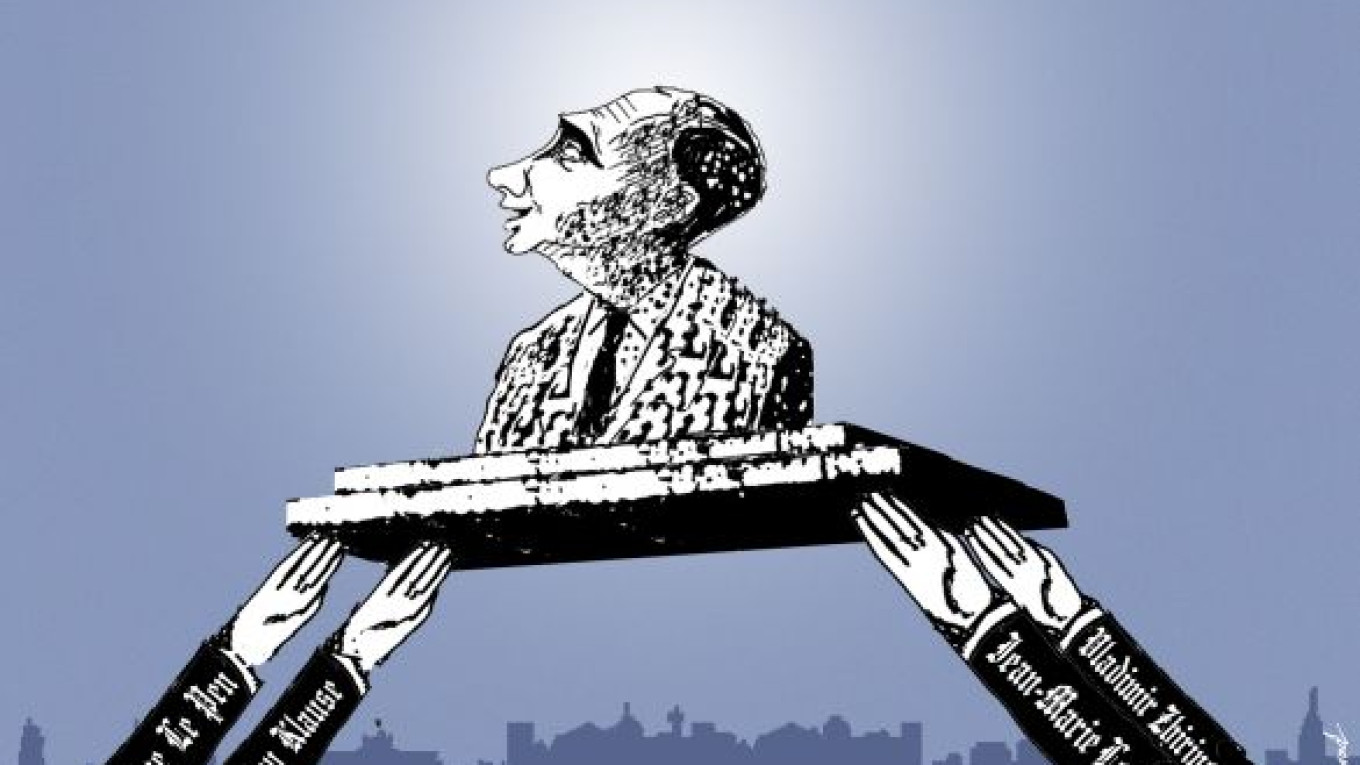A surprising phenomenon is increasingly apparent in Western Europe: far-right parties are moving away from their traditional anti-communist and anti-Russia ideologies with many expressing admiration and even outright support for President Vladimir Putin's regime.
To be sure, several former and current European political leaders have sought to ally themselves with Putin's regime. For example, former German Chancellor Gerhard Schröder joined the board of the Nord Stream gas pipeline project immediately after leaving office, thus ensuring Germany direct access to Russian supplies via the Baltic Sea. Similarly, The Economist described former Czech President Vaclav Klaus, a prominent euroskeptic, as one of Putin's "warmest admirers abroad." But opportunism is not ideological affinity.
By contrast, Germany's far-right National Democratic Party has demonstrated nostalgia for East German virtues, calling the defunct German Democratic Republic "a better Germany" than the Federal Republic. In 2011, the National Democratic Party officially merged with another far-right party, the German People's Union, which has long been linked to Russia's Liberal Democratic Party and its leader, the ultranationalist Vladimir Zhirinovsky.
While Zhirinovsky has long been a prominent member of Putin's opposition, he has displayed similarly authoritarian tendencies, for example, by promising to establish a police state if elected president. And his Communist links are clear. Not only was the establishment of his Liberal Democratic Party a joint project of the Communist Party of the Soviet Union and the KGB, but Zhirinovsky has also advocated returning to Germany the eastern territories, including much of Poland and the Baltic region, that it lost in World War II.
In France, the extreme right's shifting allegiances are even more pronounced, exemplified in its budding friendship with the new Russia. In a 2011 interview, Marine Le Pen, leader of the National Front, conveyed her admiration for Putin. She also announced that if she were elected president in 2012, France would leave NATO and seek a trilateral alliance with Germany and Russia.
Moreover, Marion Marechal-Le Pen, Le Pen's niece and one of the party's two members of parliament, is a leader of the National Front-sponsored France-Europe-Russia group, which advocates a "multipolar" — or, more accurately, a less American — world.
Given Putinism's uncertain ideological roots, this turn toward Russia might seem puzzling. After all, Putinism is characterized less by what it endorses than by what it opposes: the West and Western-style democracy, liberalism, communism and individualism.
In fact, Western Europe's extreme-right parties' attraction to Putin's negative agenda can be understood in relation to another authoritarian anti-ideology: Benito Mussolini's fascism in Italy. According to Mussolini's 1932 essay "The Doctrine of Fascism," written with the philosopher Giovanni Gentile, fascism opposes democracy, socialism, liberalism, individualism, Bolshevism, parliamentarianism, Freemasonry, pacifism and egalitarianism.
But while Putinism and Italian fascism share the rare characteristic of rejecting both communist and democratic ideologies, there is an important distinction in their approach to democracy. While Mussolini formally declared fascism to be anti-democratic, Putin does not openly reject democracy or explicitly advocate a one-party state. Rather, he claims to have established a "managed democracy," a system that prevents the alternation of power, thereby establishing a one-party state as a matter of fact, if not of principle.
In this sense, Putinism can serve as a model for extreme-right parties, which, in post-World War II Europe, cannot openly advocate an authoritarian regime or a one-party system. Indeed, Putinism is demonstrating how to manipulate the rules of parliamentary democracy, by which all of Europe's political parties have been forced to play since World War II's end, to serve authoritarian objectives.
Putin's public image as a strong and virile adventurer, captured in photos depicting him fishing and hunting shirtless, reinforces his appeal as a powerful, charismatic leader. In addition, there is a clear parallel between Putin's close relationship with the conservative, ultranationalist Russian Orthodox Church and the National Front's connection to integrist Catholic circles.
Furthermore, Western Europe's extreme right can learn from Putin's management of his youth organization, Nashi. Unlike the Soviet Union's Komsomol, which had all but ceased to serve as an ideological tool for the Communist Party by the time the Soviet Union collapsed, Nashi has been accused of harassing diplomats and the regime's opponents, suggesting a closer resemblance to the Hitler Youth or even Mussolini's Blackshirts. Indeed, while Nashi seems more like a collection of roguish hooligans, its members do receive paramilitary training to complement their ultranationalist ideological indoctrination.
Putinism presents a clever and effective model of a right-wing authoritarian regime that can function within modern Europe's sociopolitical constraints — one that Western Europe's extreme right seems keen to emulate. Let us hope that these forces do not make common cause with Europe's more unscrupulous mainstream political leaders.
Marcel Van Herpen, director of the Cicero Foundation, is the author of "Putinism — The Slow Rise of a Radical Right Regime in Russia." © Project Syndicate
A Message from The Moscow Times:
Dear readers,
We are facing unprecedented challenges. Russia's Prosecutor General's Office has designated The Moscow Times as an "undesirable" organization, criminalizing our work and putting our staff at risk of prosecution. This follows our earlier unjust labeling as a "foreign agent."
These actions are direct attempts to silence independent journalism in Russia. The authorities claim our work "discredits the decisions of the Russian leadership." We see things differently: we strive to provide accurate, unbiased reporting on Russia.
We, the journalists of The Moscow Times, refuse to be silenced. But to continue our work, we need your help.
Your support, no matter how small, makes a world of difference. If you can, please support us monthly starting from just $2. It's quick to set up, and every contribution makes a significant impact.
By supporting The Moscow Times, you're defending open, independent journalism in the face of repression. Thank you for standing with us.
Remind me later.


